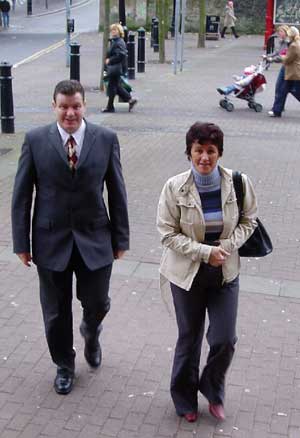27 November 2003 Edition
Former IRA Volunteer gives evidence - Bloody Sunday Inquiry
BY FERN LANE

Former IRA volunteer Gerry Doherty attending the Bloody Sunday Inquiry
A former member of the Derry IRA, Gerry Doherty, told the Saville Inquiry on Monday this week that on Bloody Sunday, IRA Volunteers were under orders not to take any action on the day.
Doherty was questioned by Christopher Clarke QC about the fact that, when he gave his original statement to the Saville Inquiry in July 1999, he did not declare his membership of the IRA on Bloody Sunday.
Doherty told the inquiry that, initially at least, he had had "no faith" in the present inquiry, partly because of the experience of the Widgery tribunal and because Saville was "a British court, set up by the British Government to investigate the British Government". Republicans, he said, have with good reason "spent a lifetime avoiding British courts" and in any case it was nothing to do with the IRA as they had not been involved in the events of the day. It was only the intervention of the families and Lord Saville himself, asking former members of the IRA to come forward, which had made him rethink.
The inquiry heard that on Bloody Sunday Doherty was three days short of his 17th birthday, having lied about his age to join the IRA. Having been told that the IRA was not to take any action on the day, he decided to join the march. He recalled that he had taken part in the stoning of the British Army but had then made his way down to Chamberlain Street. He said that he realised that the army had opened fire when he witnessed Mickey Bridge being shot and wounded in the thigh by a British soldier who he saw "looking right at Mickey Bridge with his gun up... he was leaning against the side of the wall at the northern end of Block 1".
Shortly afterwards, some people amongst the group of marchers with whom he was sheltering behind a wall decided to make "a run for it" along block 3, but that as they did so, they were met with "quite intensive" fire. One of this group was Patrick Doherty.
A few minutes later, the remainder of those huddled against the wall walked in single file along Block 3, many of them with their hands raised. Doherty recalled that "some people said there were strike marks on the wall where the people who had gone first had been directly shot at". As the group walked they heard more shots. Doherty himself ran and fell into a doorway.
He was asked about the evidence of the informer Paddy Ward in which he, Ward, claimed that he was contacted by Doherty when the planned 'nail bomb attack' in the city centre was abandoned. Doherty told the inquiry that he did not know Ward on Bloody Sunday and had only learned of his existence from Liam Clarke and Katherine Johnson's book, From Guns to Government.
In relation to Ward's claim that IRA men who were killed by the British Army would be secretly buried, Doherty was asked about the incident in March 1972 when Colm Keenan and Eugene McGillan were shot and killed by the British Army. Ward told Clarke and Johnson that another IRA man had also been killed but his body was taken over the border and buried. Doherty told the inquiry: "It sounds like a fairy tale to me. I am not aware of any IRA man being killed and secretly buried; it just would not happen."
He was also questioned by Edwin Glasgow QC for some of the soldiers, who suggested to him that he "personally had a reputation for being a particularly violent young man - in the light of everything that happened and the convictions so shortly after - or do you regard yourself... as being just typical of the young hooligans of your age?". Doherty responded: "No, I was a soldier in the IRA. Those convictions that I got were as a result of [being] a soldier in the IRA."
Glasgow then questioned Doherty's participation, unarmed, in the rioting on Bloody Sunday, suggesting, somewhat ludicrously, that his intention was to kill soldiers with his "bare hands".
"A riot is a riot," replied Doherty. "How many soldiers have been killed being hit by a stone? I do not know of any, over 30 years of trouble."
Glasgow continued, suggesting that because Doherty was not on active duty on Bloody Sunday, "you felt free to join your friends and go down to the barrier and riot and kill soldiers with your bare hands if the opportunity had arose, but that did not count as active service did it? That is regarded as inactivity by you at that time, was it, killing people with your bare hands in riots?" He did not explain how an unarmed 16-year-old could have killed a heavily armed soldier, surrounded by several other heavily-armed soldiers, with his bare hands. However, at this point Lord Saville intervened and told Glasgow that his questioning was becoming "tendentious".
